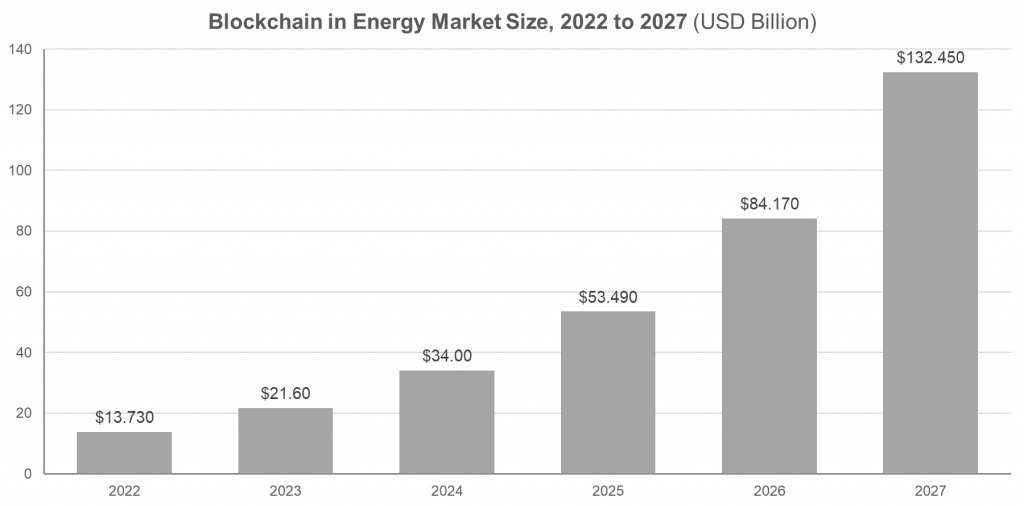Blockchain In Oil And Gas Industry
The oil and gas industry has traditionally been recognized for its complex operations and intricate supply chains. Nevertheless, with the advent of blockchain technology, the industry finds itself in a remarkable position to transform its operations completely and achieve unprecedented levels of efficiency. Blockchain, an innovative decentralized ledger system, holds immense potential to revolutionize the oil and gas sector. It can streamline supply chain management, optimize asset maintenance, facilitate secure transactions, and bolster data integrity, presenting a promising opportunity for substantial advancements in the industry.
Growth of the Blockchain Market
The blockchain market in the energy sector demonstrated significant growth, with a valuation of USD 13.73 billion in 2022. This growth trajectory is projected to continue to an estimated value of approximately USD 132.45 billion by 2027, representing a remarkable compound annual growth rate (CAGR) of 46.2 %, as per Stellarix’s analysis. Hence, this exponential expansion underscores blockchain technology’s increasing recognition and adoption as a transformative force within the energy industry, offering immense potential for innovation and efficiency gains in the years ahead.

Figure: Energy Market Size, Blockchain
Oil and Gas Companies Using Blockchain
Several energy companies, precisely oil, and gas, are in a race to go technology bound. Petroteq and BHP Billiton are one of the trailblazers to introduce blockchain. It has helped them enhance operational efficiency. The implementation has aided them in monitoring, tracking, controlling, and using the available resource optimally. However, energy giants like Shell, Repsol, TotalEnergies, and Pemex have also put their might in that direction.
Pemex was the first petroleum company to accept payment through blockchain. Shell, a key player in the energy industry, is leveraging blockchain technology to promote sustainable fuels in transportation. Interestingly, Repsol invested in Finboot, a tech startup known for blockchain as a service. Similarly, TotalEnergies partnered with Circulor, a blockchain traceability provider.
Key Challenges in the Oil and Gas Industry
- Transparency Issues: Nurturing a culture of meticulous attention to detail, companies dedicate significant time and resources to ensure the seamless organization and accessibility of crucial documents, encompassing compliance records, audits, and associated paperwork, fostering a robust framework of transparency and accountability for all stakeholders. Thus, issues may occur while attempting it.
- Problems in Payments: Navigating the intricate realm of oil and gas contracts, companies grapple with multifaceted payment structures that demand astute financial acumen. Additionally, cross-border transactions introduce complexities, necessitating intermediaries and incurring supplementary costs. This requires deftness in managing financial arrangements while safeguarding profitability.
- Efficiency and Time Management: As energy transactions grow in complexity, the industry confronts an intricate web of diverse orders and documents spanning purchase invoices, shipping manifests, and bank fund releases. These intricacies compound the process’s challenges, necessitating meticulous attention to detail and a focus on streamlining operations to optimize both cost-effectiveness and time management.
- Supply Chain Management: The oil and gas supply chains operate within a web of interdependencies. It involves multiple stakeholders, such as shippers, suppliers, and customers. This intricate network demands substantial administrative overheads to ensure seamless coordination. Nonetheless, it also creates an inherent potential for errors, underscoring the importance of meticulous oversight and agile management to maintain efficiency and mitigate operational risks.
Oil and Gas Industry: Blockchain to Improve Transparency and Accountability
- Introducing Transparency to Business Processes: Blockchain technology can rise in a new era of transparency in intricate and convoluted oil and gas supply chain processes. By leveraging the remarkable transparency features of blockchain, a comprehensive ledger system becomes accessible to all, promoting a culture of transparency and accountability.
- Enabling Performance Audits of Oil and Gas Royalties and Revenues: Blockchain’s extraordinary attributes, including operational transparency, traceability, tamper-proofing, and immutability, empower regulatory authorities and oil and gas enterprises’ owners to conduct meticulous performance audits of royalties and revenues. Moreover, these features expedite the verification process for owners, ensuring swift and accurate assessments.
- Facilitating Data Storage and Maintenance: Blockchain technology is a proficient data storage and maintenance facilitator, acting as a single repository managed by a consortium of esteemed stakeholders. Through the application of smart contracts, data is automatically organized into a digestible format, eliminating the need for manual re-organization and streamlining data management.
- Eliminating the Need for Intermediaries: Embracing blockchain technology eradicates the necessity for intermediaries like clearinghouses and cumbersome back-office administrative tasks commonly associated with risk management and accounting functions. This transformation enhances scheduling and back-office efficiency, increases trade accuracy, and reduces costs.
Blockchain’s Impact on Oil and Gas Shipment Tracking
- Enhancing Supply Chain Efficiency: Blockchain technology can revolutionize oil and gas supply chains, leading to improved efficiencies that translate into lower prices and enhanced safety measures. Moreover, leveraging blockchain’s capabilities enables the industry to make strides toward environmental sustainability.
- Lowering Transaction Costs: Implementing a secure blockchain system presents an enticing opportunity for oil and gas companies, as it reduces transaction costs. Thus, with features like risk mitigation, enhanced transparency, an immutable audit trail, and expedited transactions, blockchain technology offers an appealing alternative that can streamline operations and lower associated costs.
- Streamlining Payments and Sales Diversification: Blockchain has the potential to streamline payment processes and facilitate sales diversification throughout the entire energy supply chain. By leveraging cryptocurrencies like Bitcoin, oil companies can bypass the involvement of banks and brokers, resulting in accelerated high-volume sales while eliminating intermediary costs. This, in turn, reduces sales expenses and opens avenues for attracting new investors to the industry.
- Automating Procedures and Enhancing Transparency: Integrating blockchain technology into the oil and gas supply chain enables the automation of various procedures and fosters a higher degree of transparency. By automating manual processes and providing transparent and auditable records, blockchain contributes to reducing operational costs and eliminating delays that may arise due to inefficiencies in the current system.
Benefits of Introducing Blockchain Technology for the Oil and Gas Industry
- Driving Innovation and Partnership: Blockchain technology opens up opportunities for innovation and collaboration within the oil and gas industry. By creating a transparent and decentralized platform, blockchain enables peer-to-peer energy trading and promotes the integration of renewable energy sources. Furthermore, producers, distributors, and consumers can directly engage in energy transactions, bypassing traditional intermediaries. This minimizes costs and allows for real-time settlement and accurate tracking of energy flows. Blockchain-based platforms also encourage collaboration among industry players, enabling data sharing and facilitating joint ventures and partnerships.
- Safeguarding Valuable Information: Data security is essential in the oil and gas industry, where sensitive information and intellectual property are at stake. Blockchain technology addresses this concern by providing a decentralized and tamper-proof ledger for secure data storage and access. Also, cryptographic algorithms ensure data integrity and prevent unauthorized tampering. Companies can securely share information, collaborate with partners, and protect their intellectual property rights. Moreover, blockchain enables granular access controls. It allows companies to define who can view and access specific data, further enhancing data security.
- Gaining Operational Efficiencies Assimilating IoT with Blockchain: The industry stands to gain significant operational efficiencies by adopting emerging technologies like blockchain and IoT (Internet of Things). Gazprom Neft, a prominent Russian oil company, highlights the potential of digital technologies, citing a remarkable 10-15% increase in productivity. These transformative technologies enable real-time data management, enhanced resource utilization, streamlined operations, secure transactions, and improved supply chain transparency. Hence, by harnessing the power of these advancements, the industry can unlock new levels of productivity and drive sustainable growth.
Conclusion
While blockchain technology presents immense potential for the oil and gas industry, a series of hurdles exist. They necessitate surmounting its widespread embrace. To fully unlock the boundless capabilities of blockchain in this sector, paramount importance lies in tackling challenges. It includes scalability, interoperability, regulatory compliance, data privacy, cost implications, and fostering an environment of collaborative synergy amongst industry stakeholders. So, through a concerted effort to address these intricate obstacles, the industry can harness the transformative power of blockchain technology. It can revolutionize operations, fortify security measures, and propel unrivaled efficiency across the entirety of the oil and gas value chain.
To seek help and expand your company in oil and gas industry using blockchain, contact us
Let's Take the Conversation Forward
Reach out to Stellarix experts for tailored solutions to streamline your operations and achieve
measurable business excellence.



